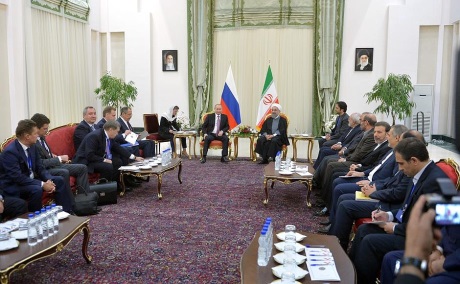Russia resumes nuclear technology exports to Iran
24 November 2015
Russian companies can again supply products, services and funds to support Iran's civilian uranium enrichment program following President Vladimir Putin's signing of a decree yesterday. The decree was issued on the same day as Putin arrived in Tehran on an official visit, during which he held talks with Iranian President Hassan Rouhani and the country's Supreme Leader Ali Khamenei, and attended the Gas Exporting Countries Forum.
 |
| Putin and Rouhani following their talks in Tehran yesterday (Image: Russian President's Office) |
The newly signed document, which the Russian government published yesterday, stipulates that Russia's ban on supplying goods, materials and equipment no longer applies to the export of enriched uranium from the Islamic Republic of Iran.
Russia's move follows the adoption last month of the Joint Comprehensive Plan of Action (JCPOA), the international agreement limiting Iran's nuclear program in return for the lifting of economic sanctions. All participants in the agreement will now prepare for the implementation of their respective commitments.
The Russian decree outlines three areas where the country can resume its support for Iran's civilian nuclear industry: modifying two cascades at the Fordow uranium enrichment plant, supporting Iran's export of surplus enriched uranium – above the 300 kilogram limit - in exchange for Russian raw uranium supplies, and upgrading the Arak heavy water reactor.
The JCPOA was signed in July by Iran and the E3/EU+3 (China, France, Germany, Russia, the UK and the USA - also referred to as the P5+1 - plus the European Union). Under its terms, Iran agreed to limit its uranium enrichment activities, eliminate its stockpile of medium-enriched uranium and limit its stockpile of low enriched uranium over the next 15 years. The International Atomic Energy Agency is tasked with overseeing Iran's actions under the agreement.
Following their talks, Putin and Rouhani witnessed the signing of a number of agreements between their countries in a range of industries, including health, travel, finance, railways, thermal power, desalination and groundwater.
The leaders then held a press conference, during which Putin said, "We will provide maximum assistance to implement a corresponding action plan within the framework of the Iranian nuclear program, approved in July by the UN Security Council. Among other things, we will help process enriched uranium and convert manufacturing plants to create stable isotopes for research purposes."
Putin, whose comments were published on his official website, also said: "We will continue mutually beneficial cooperation in nuclear energy. The first unit of the Bushehr nuclear power plant is already at full capacity, and work has begun on the second and third unit."
In November last year, Russia agreed to build up to eight new nuclear power reactor units in Iran - four at Bushehr and four at another, yet to be determined site.
Putin congratulated Gas Exporting Countries Forum leaders on "successfully holding this major international event" and added that Russia intends to increase the volume of its gas production by 40% by 2035.
It is Putin's first official visit to Iran since 2007.
Researched and written
by World Nuclear News